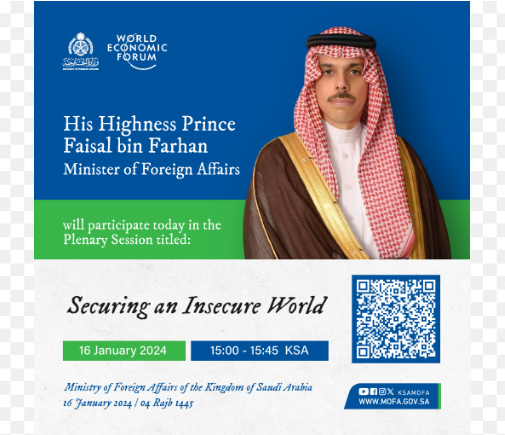Virendra Pandit
New Delhi: After over 100 days of the Gaza Conflict, which has claimed more than 25,000 lives so far, and Iran attacking three countries with missiles—Iraq, Syria, and Pakistan—the Saudis have sounded an alarm on the escalating wars in the Middle East.
“We are incredibly concerned for regional security,” Saudi Arabia’s Foreign Minister Prince Faisal Bin Farhan said at the ongoing World Economic Forum (WEF) Annual Meeting 2024 at Davos, Switzerland, on Tuesday.
He also said that Saudi Arabia is ready to formally recognize Israel despite the war against Hamas if it takes steps toward a two-state solution, the media reported.
“Peace and security for Israel is intimately linked with peace and security for the Palestinians,” he said, asserting, “We agree that regional peace includes peace with Israel. But that can only happen through a Palestinian state.”
Even as the Hamas-Israel war is raging and the Iran-supported Shia Houthis of Yemen and Lebanon-based Hezbollah are escalating the conflict, Tehran this week attacked Syria, Iraq, and Pakistan on different pretexts– to divert attention from domestic crises like continuing agitation by anti-veil women, rising unemployment and others. By launching these attacks—and supporting Shia terror groups like Houthis and Hezbollah—Tehran is seeking to ride a patriotic bogie against its enemies within and without.
Reacting strongly to the Irani attack on its Kurdish region, Iraq recalled its ambassador to Tehran. Pakistan, whose Baluch areas were attacked, warned its Shia neighbor of “serious consequences.”
It is in this context that Saudi Arabia said that it is “incredibly concerned” about Middle East security.
Prince Faisal Bin Farhan reiterated the need for an urgent cease-fire in Gaza to resolve the conflict. During the cessation of hostilities, international powers should use diplomacy to end the Houthi group’s shipping attacks in the Red Sea as well, he said.
“Freedom of navigation in the Red Sea impacts all of us. We think the priority needs to be de-escalation — de-escalation in the Red Sea and the entire region. Part of that is making sure we engage with all stakeholders.”
The Red Sea has been disrupted by Houthi attacks since mid-November as the Yemeni group has fired missiles and drones and tried to capture vessels which it says is in support of Hamas and Palestinians. Last week, the US and UK launched missiles at targets in Yemen used by the group to stop Houthi assaults.
But the Iran-backed group said that it would step up its aggression until Israel pulled out of Gaza as they freshly hit a Greek-owned bulk carrier.
Saudi Arabia has been trying to reach a peace deal with the Houthis for more than a year. Although none of their vessels have been targeted, countries have begun to increasingly avoid the Red Sea which may lead to further rises in global freight costs.
A cease-fire in Gaza is all the more necessary because Israel is not achieving its aims in the war, he said, referring to Israel’s prime minister Benjamin Netanyahu’s statement that war must continue until Hamas is destroyed.
“Frankly, we don’t see any real sign that any strategic objective of Israel is coming any closer. We need to have a cease-fire immediately. Continuing as we are now — continuing to see the suffering that’s happening in Gaza — is likely to lead to continuing cycles of escalation,” the Saudi minister said.

